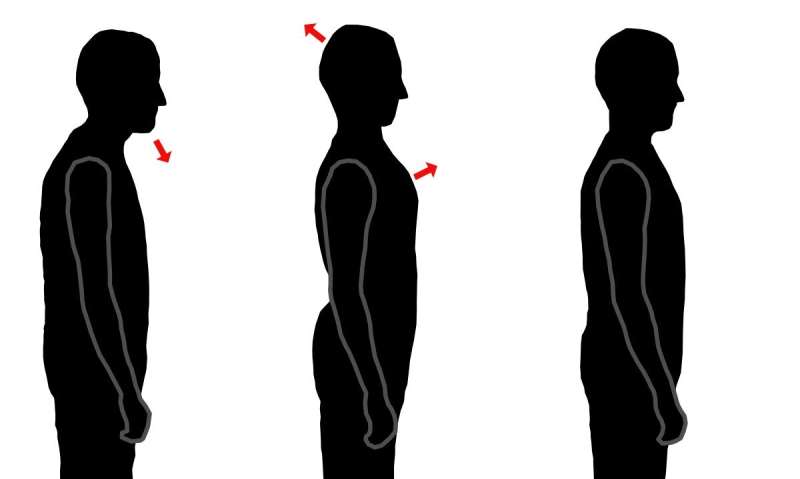New research explores how different postural intentions affect balance in older adults. From left to right: “relaxed,” “effortful” and “light” postural intentions. Credit: Timothy W. Cacciatore
Your parents told you to sit up straight. Your fitness trainer tells you to engage your core. Turns out it might be bad advice—and it could inadvertently increase the risk of falls in older adults.
Researchers in the Mind and Movement Lab in the University of Idaho's College of Letters, Arts and Social Sciences found that when older adults thought about posture as effortful, they had worse balance than when they stood in a relaxed way. In contrast, participants had the best balance when they thought about "lightening up" into length.
"The most common ways of thinking about posture suggest that we are weak and need to 'engage our core' or tighten abdominal muscles to pull up into length," said Rajal Cohen, lead researcher and associate professor in U of I's Department of Psychology and Communication Studies. "But we found that thinking of upright posture as inherently effortful may actually make balance worse."
Researchers instead turned to an idea from a mind-body practice called the Alexander technique, which uses embodied mindfulness practices to reduce accumulated tension in the body and help individuals develop more efficient movement and posture habits. A key idea in the Alexander technique is that instead of "pulling themselves down," people can learn to "lighten up" into length.
Based on this study's findings, published March 24, in the journal "Innovations in Aging,"lightening up is a better approach to posture than pulling up, at least when it comes to balance in older adults.
The study had participants try out effortful, light and relaxed posture instructions while standing on a foam mat on one leg. Based on recordings from the participant's muscles and on self-reports, the participants worked much harder when applying the effortful posture instructions, but their balance was actually better during light instructions.
"Our ultimate aim in this study is to help prevent falls in older adults," Cohen said. "Older adults are at a higher risk for falls, and the consequences of falling can be very bad, in terms of injuries and financial cost and even fatalities. Our results suggest that common, effortful ways of thinking about posture can actually make our balance worse and increase the risk of falling."
The study has implications for fitness trainers, rehabilitation professionals and movement teachers, who often cue posture as part of treatment or classes. By using effortful posture cues like "stand up straight," "engage your core," or "pull yourself up to your full height," such practitioners may be unintentionally affecting their clients' balance in a negative way. By instead using "lighten up" posture cues, therapists and movement teachers can facilitate better balance, at least in older adults.
"Posture still seems to matter," Cohen said, "but we could do ourselves and our clients a favor by lightening up about it."
More information: Rajal G Cohen et al. Lighten Up! Postural Instructions Affect Static and Dynamic Balance in Healthy Older Adults, Innovation in Aging (2020). DOI: 10.1093/geroni/igz056
Provided by University of Idaho























